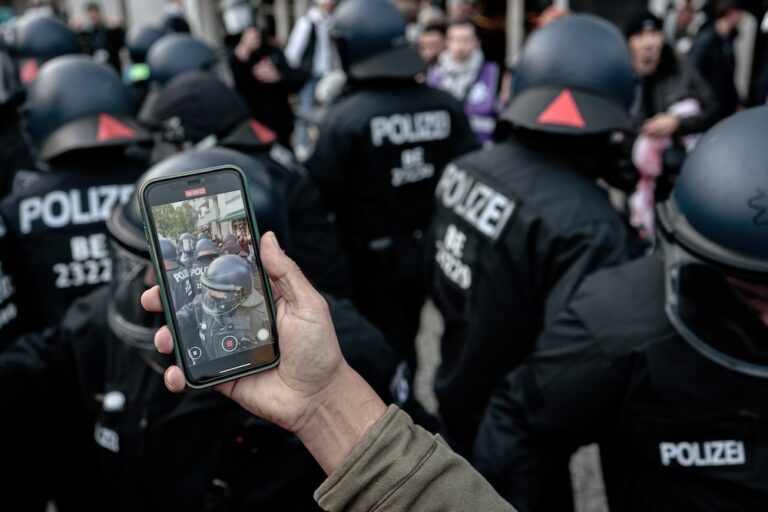(Freedom House/IFEX) – The following is a Freedom House press release: Press Freedom Findings in Middle East and North Africa Disappointing after Earlier Hopeful Years Reversing improvements seen in the last few years, press freedom in the Middle East and North Africa declined in 2006, and the region as a whole continued to show the […]
(Freedom House/IFEX) – The following is a Freedom House press release:
Press Freedom Findings in Middle East and North Africa Disappointing after Earlier Hopeful Years
Reversing improvements seen in the last few years, press freedom in the Middle East and North Africa declined in 2006, and the region as a whole continued to show the lowest ratings worldwide, according to a report released today by Freedom House.
Freedom of the Press, an annual survey tracking global trends in media freedom, had noted modest improvements in press freedom in the Middle East and North Africa over the last several years. However, this year’s study found that the trend reversed in 2006, with several countries that had previously shown improvement moving in a negative direction. Only one country was rated Free, two were rated Partly Free, and 16 were rated Not Free in 2006. Declines in ratings maintained the MENA region’s status as the most poorly performing region in the world in terms of press freedom.
Narrative reports and ratings for countries in the Middle East and North Africa are available online. Charts, graphs and interactive maps are also available online.
“Though there are some positive elements to this year’s findings for press freedom in the Middle East, it’s very disheartening to see that the modest gains noted last year have largely been erased,” said Jennifer Windsor, Executive Director of Freedom House. “The results show that there is very little room for citizens to speak their minds or receive uncensored information about their governments and the rest of the world.”
The media environment in the Middle East and North Africa had improved in earlier years due to the spread and influence of pan-Arab satellite television networks and increased access to unfiltered sources of information on the Internet. In some countries, print media had also become more critical as journalists took the lead in pushing the boundaries of acceptable coverage. However, this year’s report found that the media in most countries in the Middle East and North Africa continue to be constrained by extremely restrictive legal environments, in which laws concerning defamation, the insult of public figures, and emergency legislation hamper the ability of journalists to write freely.
“The Middle East and North Africa are home to some of the most repressive governments in the world, and these governments have found a way to limit citizens’ natural craving for free expression and unfiltered information,” said Ms. Windsor. “While there have been some changes in the past few years, ultimately we’ve also seen some real pushback on the part of governments.”
In Egypt, official resistance to greater press openness halted the improvements seen over the past several years. Journalists continued to face harassment and violence in 2006, and much-anticipated amendments to the Press Law that were enacted left intact provisions criminalizing criticism of the president or the publishing of “false news.” In addition, authorities lashed out at Internet freedom when they detained the first Egyptian blogger for his writings in November.
Ongoing instability and violence were the biggest threats to press freedom in Iraq in 2006. Sixty five journalists were killed, with Iraqi insurgent groups conducting targeted kidnappings and attacks on the media. Restrictions on the press also took other forms in 2006, as the new Iraqi government took action against reporters. Prime Minister Nuri al-Maliki’s government threatened to close media outlets for “inciting violence,” and TV stations were banned from showing violent footage of events within Iraq.
The legal environment continues to constrain relatively high regional performers such as Jordan, Morocco, and Algeria. In Jordan, though the king has repeatedly pledged reform, the government again failed to enact a long-awaited new press law. In Morocco, the use of legal harassment against independent journalists increased in 2006, with a highly influential editor forced to resign due to the threat of crippling fines in a defamation case, and another paper temporarily suspended after printing jokes about the royal family and the prophet Muhammad.
Saudi Arabia’s score declined in 2006 to reflect a rise in the number of journalists detained during the year, particularly those who criticized the government and the religious establishment. Conditions in Iran also deteriorated further as authorities cracked down on independent media outlets and journalists, increasingly targeting internet-based sources of information.
Of long-standing concern are Libya, Syria, Tunisia, and the Israeli-Occupied Territories/Palestinian Authority, where media freedom remained extremely restricted in 2006.
Freedom House is an independent, nongovernmental organization that supports the expansion of freedom in the world.


